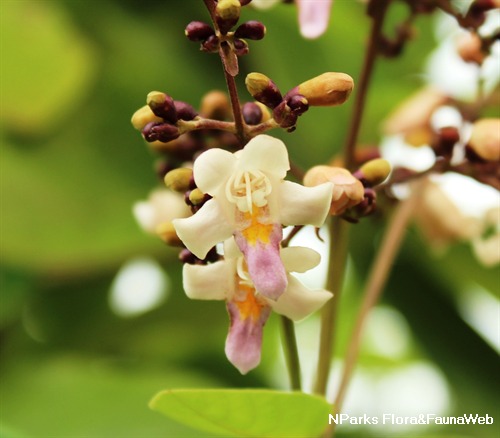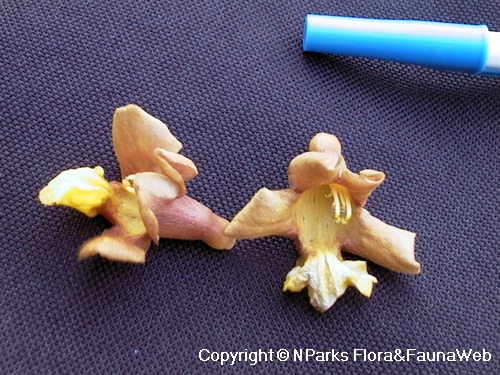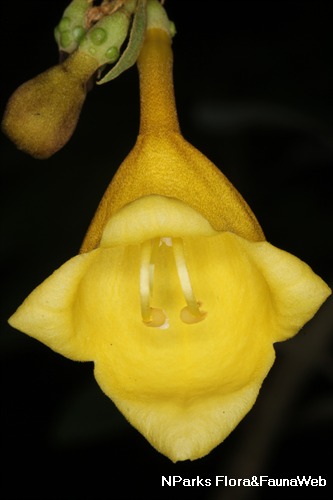_lowres.jpg)
Back
Gmelina elliptica Sm.
| Family Name: | Lamiaceae (Labiatae) |
| Synonyms: | Gmelina villosa Roxb. ex Jack, Gmelina tonkinensis Moldenke, Gmelina tomentosa H.R.Fletcher, Gmelina integrifolia W.Hunter, Gmelina asiatica var. villosa (Roxb. ex Jack) Bakh., Gmelina asiatica f. inermis Moldenke |
| Common Name: | Bulang, Common Bulang, Bulangan, Bulongan, Bulang Gajah, Bulang Hutan, Bulang Kecil, Pukang Mata Hari |
Name
Classifications and Characteristics
| Plant Division | Angiosperms (Flowering Seed Plants) (Dicotyledon) |
|---|---|
| Plant Growth Form | Tree (Shrubby (1m-5m), Small (6m-15m)), Shrub |
| Lifespan (in Singapore) | Perennial |
| Mode of Nutrition | Autotrophic |
| Maximum Height | 10 m |
Biogeography
| Native Distribution | Vietnam, Laos, Thailand, Cambodia, Malaysia, Singapore, Indonesia, and the Philippines |
|---|---|
| Native Habitat | Terrestrial (Secondary Rainforest, Coastal Forest, Disturbed Area / Open Ground) |
| Preferred Climate Zone | Tropical, Sub-Tropical / Monsoonal |
| Local Conservation Status | Native to Singapore (Endangered (EN)) |
Description and Ethnobotany
| Growth Form | It is a thorny, scrambling, evergreen shrub or small tree that can grow up to 10 m tall. |
|---|---|
| Foliage | Its opposite, stalked leaves have leaf blades that are oval or egg-shaped, not covered with hair above, densely covered with hair and greyish-white below, 1.9–9 by 1.3–6.4 cm, and with tiny green glands at the base. |
| Flowers | Its flowers are in flowering shoots that are up to 10 cm long. Its flowers are clear yellow, bell-shaped with 4 lobes, and 3.8 cm long. |
| Fruit | Its fruits are drupes, partially round, yellow with a watery flesh, and 1.9–2.5 cm in diameter. |
| Habitat | It grows in villages, open secondary vegetation, and along coastals, up to 500 m altitude. |
| Cultivation | It can be propagated by seed. |
| Etymology | Latin Gmelina, given in honour of Johann Gottlieb Gmelin (1709–1755), a German traveller and naturalist; Latin elliptica, elliptic, referring to the shape of its leaf blades |
| Ethnobotanical Uses | Medicinal: Its leaves are a laxative,
and are rubbed on gums to treat toothache. The leaves or roots are applied to
wounds. The roots are shredded with a grater or shark’s skin, and mixed with
the urine of young children, and this is used to treat headaches, skin-related
ailments, and rheumatism. Its roots are also mixed with lime to treat
swellings, and is used for anemia, and also applied on the head for the
prevention of hair loss. The fruit pulp, together with garlic and lime, is used
on the body for dropsy. The skins of the fruits are made into sweetmeat.
Roasted fruits are used against itching of the feet. An extraction of slightly
crushed fruits is used as an eye lotion. Juice from the fruits or leaves are
used as ear drops to treat earache. Others: It is cultivated as a hedge. |
Landscaping Features
| Landscaping | It is suitable as hedge plant. |
|---|---|
| Desirable Plant Features | Ornamental Flowers, Ornamental Foliage |
| Landscape Uses | General, Suitable for Roadsides, Parks & Gardens, Small Gardens, Coastal, Hedge / Screening |
Fauna, Pollination and Dispersal
| Pollination Method(s) | Biotic (Fauna) |
|---|---|
| Seed or Spore Dispersal | Biotic (Fauna) |
Plant Care and Propagation
| Light Preference | Full Sun |
|---|---|
| Water Preference | Moderate Water |
| Plant Growth Rate | Moderate |
| Rootzone Tolerance | Moist Soils, Well-Drained Soils, Saline Soils / Salt Spray, Fertile Loamy Soils |
| Propagation Method | Seed |
Foliar
| Foliage Retention | Evergreen |
|---|---|
| Mature Foliage Colour(s) | Green |
| Foliar Type | Simple / Unifoliate |
| Foliar Arrangement Along Stem | Opposite |
| Foliar Attachment to Stem | Petiolate |
| Foliar Shape(s) | Non-Palm Foliage (Oval, Elliptical) |
| Foliar Venation | Pinnate / Net |
| Foliar Margin | Entire |
| Leaf Area Index (LAI) for Green Plot Ratio | 3.0 (Tree - Intermediate Canopy) |
Floral (Angiosperm)
| Flower & Plant Sexuality | Bisexual Flowers |
| Flower Colour(s) | Yellow / Golden |
|---|---|
| Flower Grouping | Cluster / Inflorescence |
| Flower Location | Terminal |
| Individual Flower Shape | Campaulate / Bell-shaped |
Fruit, Seed and Spore
| Mature Fruit Colour(s) | Yellow / Golden |
|---|---|
| Fruit Classification | Simple Fruit |
| Fruit Type | Fleshy Fruit , Non-Accessory Fruit |
Image Repository
Others
| Master ID | 1648 |
|---|---|
| Species ID | 2941 |
| Flora Disclaimer | The information in this website has been compiled from reliable sources, such as reference works on medicinal plants. It is not a substitute for medical advice or treatment and NParks does not purport to provide any medical advice. Readers should always consult his/her physician before using or consuming a plant for medicinal purposes. |

_lowres.jpg)
_lowres.jpg)
_lowres.jpg)
_lowres.jpg)
_lowres.jpg)
_lowres.jpg)
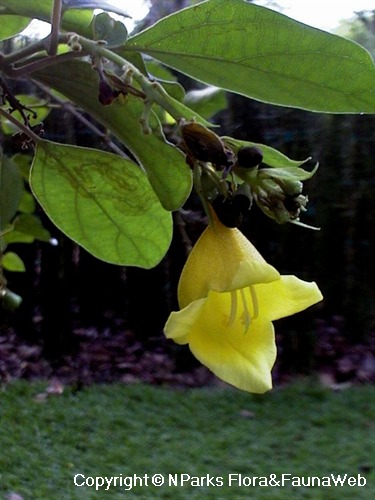
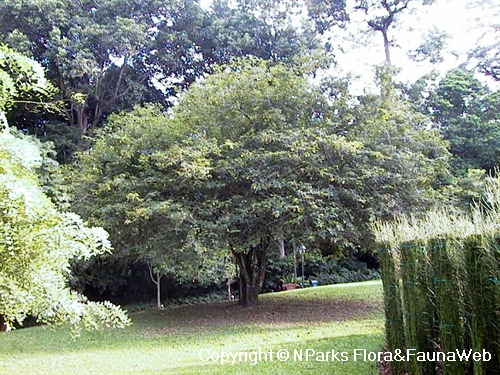
_lowres.jpg)
